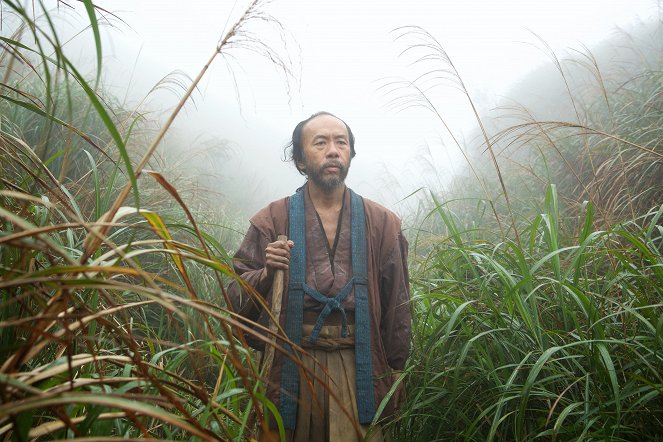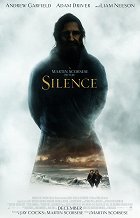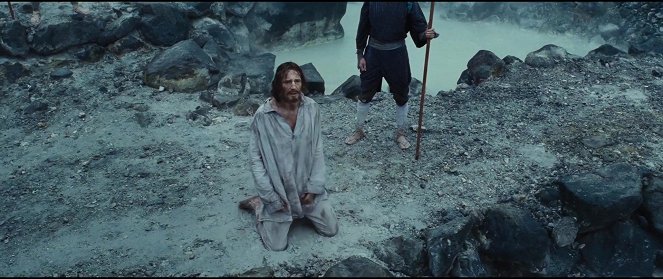Directed by:
Martin ScorseseCinematography:
Rodrigo PrietoCast:
Andrew Garfield, Adam Driver, Liam Neeson, 浅野忠信, Ciarán Hinds, Shin'ya Tsukamoto, Yōsuke Kubozuka, Ogata Issei, Hiroyuki Tanaka, Ryō Kase, 小松菜奈, 美知枝 (more)VOD (2)
Plots(1)
In the seventeenth century, two Jesuit priests face violence and persecution when they travel to Japan to locate their mentor and to spread the gospel of Christianity. (official distributor synopsis)
Videos (19)
Reviews (12)
The silence of a directorial genius. It has gorgeous cinematography, but that’s something I take for granted and consider mandatory in world-class filmmakers; the dialogues have something to then, and the message is morally unquestionable, carved into the viewer with a surgically precise pace and methodical narrative rhythm. BUT steady pace does not equal quality pace, and I personally didn't become a staunch defender of the art of filmmaking in order to patiently stoke my faith in a director's divine abilities, which began to fade after a few dozen emotionally catatonic minutes, and even after 160 long minutes, it didn't even come close to rediscovering itself, unlike the steadfast protagonist. To fully appreciate the film on a purely narrative level, I guess I wouldn't have to be such a die-hard atheist and hardened ignoramus of man's blind faith in supernatural forces and the hellish consequences of betraying one's own beliefs; to enjoy it as a visual self-questioning catharsis, it wouldn't have to talk and repeat so much simple, universally understood religious motifs. God bless Scorsese for taking on such heavy and massively impenetrable material in the first place, but this time I dare to tread on his sacrament and I can honestly say that if Bruce Wayne had popped up behind Liam Neeson's back at the end and kicked his ass with kung fu, I might have been a lot happier with the outcome. Kundun, although with a less serious subject, was much more enjoyable.
()
If Martin Scorsese didn't have a hand in this, I'd probably avoid it in a big way. Unfortunately, I have to say that his contribution is not very good this time around, and except for about three very interesting camera shots, the whole film is very monotonous and at times drags incredibly. I understand what Martin Scorsese wanted to convey and it certainly has a concept. But in the end I suffered through the whole two and a half hours more out of respect for the director than for any other reason.
()
I admire Martin Scorsese for reaching for matters of the heart without hesitation, even after audience-pleasing films like The Wolf of Wall Street or Shutter Island, knowing that it may not be successful commercially. And as is customary with matters of the heart, one reluctantly leaves out, limits, or shortens one's expectations. The fight for truth, against suffering, and with one's own ego, is portrayed in a way that is a destructive spectacle, thanks in large part to a phenomenal performance from Andrew Garfield. It raises a hundred and one questions, but mostly focuses on the same topic, which inevitably becomes tiresome even for the most accommodating viewer given the copious running time. Through Rodrigo Prieto's captivating camera work, Silence is visually stunning, but due to the sluggish screenplay, it is a bit challenging to engage in conversation about it.
()
After releasing masterfully crafted genre movies that won the favor of mass audiences, Martin Scorsese tried his hand at a more demanding project. And just like in The Last Temptation of Christ and Kundun, he turned his attention to religion. Built on dialogue, atmospheric shots of the given locations and subtle use of sounds, Silence is a slow film almost without any music. The structure is reminiscent of Coppola’s Apocalypse Now. Even as an atheist, I was surprised to enjoy the psychological analyses of the characters and the philosophical musings about the importance and consequences of faith, as well as the responsibility of its promulgators. Andrew Garfield is really, REALLY good.
()
An artistic statement that is not as thought-provoking as The Last Temptation of Christ, yet it is a beautiful piece of filmmaking, thoughtful, with first-class visual compositions. My relationship with this film is ambivalent. The main characters – the Christian priests – didn’t have my sympathy because they were spreading the gospel in a culturally different country where no one asked them to (and where Buddhism was strongly rooted) and at the cost of immeasurable suffering for the common folk, bleeding and dying, but at the same time, this account of Scorsese as a deeply religious man is so honest that you have to admire it, even if you might be ideologically inclined in a different direction. Scorsese wanted more, to show that the people of the distant past deeply believed in symbols and that strongly rooted beliefs cannot be broken, no matter how hard the hostile environment tries. Everyone believes in something. Some believe in the power of nature, some in the power of family, others in the power of money, and Scorsese and other Christians in the power of the Christian God. And I, an ordinary person and a mere atheist, have no right to deny and question this belief. Although I will still side with Father Ferreira (Liam Neeson) and prefer the aforementioned The Last Temptation of Christ, which was deeper. PS: Garfield was brilliant. I was already intrigued by him already in The Social Network and I knew we would hear a lot about this guy.
()
Gallery (56)
Photo © Paramount Pictures



Ads